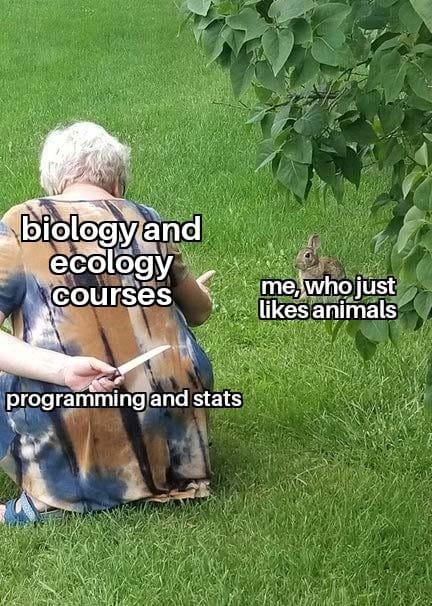this post was submitted on 22 Jun 2025
464 points (99.6% liked)
Science Memes
15351 readers
2183 users here now
Welcome to c/science_memes @ Mander.xyz!
A place for majestic STEMLORD peacocking, as well as memes about the realities of working in a lab.

Rules
- Don't throw mud. Behave like an intellectual and remember the human.
- Keep it rooted (on topic).
- No spam.
- Infographics welcome, get schooled.
This is a science community. We use the Dawkins definition of meme.
Research Committee
Other Mander Communities
Science and Research
Biology and Life Sciences
- [email protected]
- [email protected]
- [email protected]
- [email protected]
- [email protected]
- [email protected]
- [email protected]
- [email protected]
- [email protected]
- [email protected]
- [email protected]
- [email protected]
- [email protected]
- [email protected]
- [email protected]
- [email protected]
- [email protected]
- [email protected]
- [email protected]
- [email protected]
- [email protected]
- [email protected]
- [email protected]
- [email protected]
- !reptiles and [email protected]
Physical Sciences
- [email protected]
- [email protected]
- [email protected]
- [email protected]
- [email protected]
- [email protected]
- [email protected]
- [email protected]
- [email protected]
Humanities and Social Sciences
Practical and Applied Sciences
- !exercise-and [email protected]
- [email protected]
- !self [email protected]
- [email protected]
- [email protected]
- [email protected]
Memes
Miscellaneous
founded 2 years ago
MODERATORS
you are viewing a single comment's thread
view the rest of the comments
view the rest of the comments

What does programming have to do with animals?
Humans are animals, and humans invented programming. Therefore, programming is applied biology.
Descart: What an excellent time to be long dead and therefore not need to even think about this logical abomination of a sentence!
Science researchers and students often spend a lot of their time doing statistical analysis, including using programming for that.
Bayesian analysis of complex intelligent systems via friston's free energy principle and active inference? Or machine learning?
Personally love the stuff circling Michael Levin at tufts university. I could also imagine there's a lot of unique model building in different biological/ecological niches.
Probably Python and R for statistical analysis, which is common nowadays in most empirical sciences.